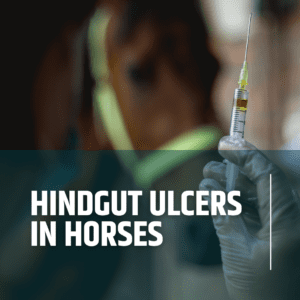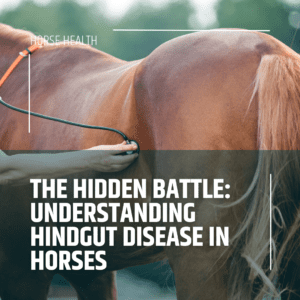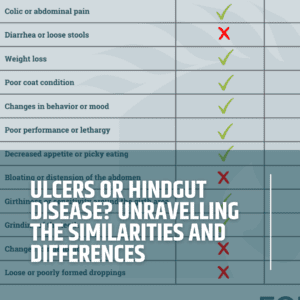
By Dr Rosemary Waring
Chief Science Officer / Tharos Co-Founder
Investigation into horse reactivity when supplementing with EquiNectar
01
Introduction
In the fascinating world of equine science, understanding a horse's behaviour and reactivity is important. As part of our ongoing commitment to this field, we collaborated with a prestigious equine college to investigate the effects of EquiNectar, our equine digestive enzyme product, on a horse's reactivity (spookiness). This study was designed to explore whether EquiNectar had any negative influence on the horses' responses when introduced to unfamiliar stimuli, a key measure of their reactivity - essentially would horses become more reactive due to EquiNectar?
The methodology involved two standard novel object tests (NOTs), recognised as reliable measures of behavioural variations in horses. These tests required the horses to navigate either a blue tarpaulin or multi-coloured streamers, both unfamiliar and potentially unsettling stimuli. To ensure accuracy, we conducted these tests twice: once before the supplementation began, and again four weeks later, with each test being video recorded for thorough analysis.
In addition to the behavioural observations, we also monitored physiological responses by measuring heart rates and eye temperatures at both stages. The results of our study provided intriguing insights into the impact of EquiNectar on equine reactivity.
02
Study design
We set up a small pilot project with leisure horses; these were 9 +/-3 years old, weighed an average of 562 +/- 42 kg and had body condition scores (BCS) of 4.77 +/-0.18 on the Henneke scale which runs from 1-9 so were representative of many owners’ animals.
We put the horses in four groups:
- Group A - a fibre-only diet with hay or haylage, chaff and sugar beet, supplemented with EquiNectar
- Group B - a fibre and concentrate diet, with hay or haylage, chaff, sugar beet and a concentrate feed, supplemented with EquiNectar
- Group C - which had the fibre diet supplemented with heat-treated EquiNectar (LITE) to denature the enzymes
- Group D which had the fibre+concentrate diet also supplemented with heat-treated EquiNectar (LITE) to denature the enzymes
03
Behaviour
The horses were required to complete two standard novel object tests (NOTs) which measure the reactivity of horses when exposed to an unfamiliar stimulus. These have been shown to be a reliable way to test variations in behaviour and involved either walking over a blue tarpaulin or through multi-coloured streamers.
The testing took place before the supplementation was started and then four weeks later and was video recorded for each horse. Heart rates and eye temperatures were measured at both stages.
04
Results
The horses’ body weights and BCS values did not change significantly during the study. The average heart rate during the NOTs did not differ significantly between the four groups nor between pre- and post-supplementation.
Within groups A and B, there were no significant differences for eye temperature between the two test situations. However, there was a significant increase in eye temperature during the post supplementation test for the controls (C+D).
05
Conclusion
EquiNectar had no impact on a horse's reactivity indicating that it does not contribute to hypersensitivity (spookiness).
06
Interpretation
Subsequent to this research being undertaken it has become apparent that not only does EquiNectar not contribute to hypersensitivity, its ability to aid digestion appears to have a calming effect on those horses who do suffer from hypersensitivity. Horses who have demonstrated agitation, discomfort and in some cases dangerous tendencies, have been seen to improve their demeanour and behaviours in all of these areas after being given EquiNectar.




